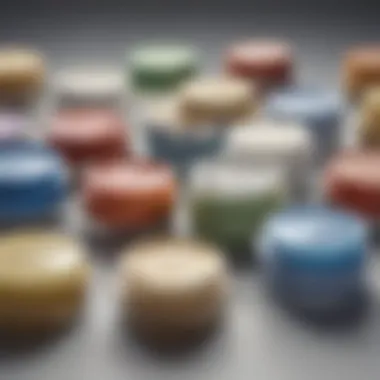Unlocking the Secrets of OTC Jock Itch Medication: Your Essential Guide to Relief


Trendy Haircut Trends
When delving into the realm of over-the-counter (OTC) jock itch medication, it's paramount to acknowledgements the importance of understanding the various options available for addressing this prevalent fungal infection affecting numerous individuals. Antifungal creams, powders, and sprays stand out as the primary forms of OTC jock itch medication worthy of exploration for those seeking relief and recovery from the discomfort caused by this fungal ailment.
To begin this comprehensive guide to exploring OTC jock itch medication, the sheer diversity of antifungal creams deserves a thorough analysis. These creams often contain active ingredients crucial for combating the fungal growth responsible for jock itch symptoms, making them a frontline defense against this irritating infection. As readers seek precise and effective solutions, selecting the appropriate antifungal cream can significantly impact their recovery process positively, underscoring the importance of informed decision-making.
Moving ahead within this multifaceted guide, the inclusion of powders as OTC jock itch medications highlights a lesser-known yet equally vital aspect of treatment. Powders, when applied strategically to the affected areas, aid in maintaining dryness and preventing further fungal proliferation, contributing to a holistic approach in managing and alleviating jock itch symptoms. Readers will benefit from understanding the unique benefits that powders bring to the table in combating this common fungal infection, enhancing their knowledge base for informed choices.
Electing to explore the realm of sprays as OTC jock itch medication marks a pivotal phase in this all-encompassing guide. Sprays offer individuals a convenient method of application, ensuring consistent and thorough coverage of the affected areas. By delving into the nuances of sprays as a treatment option, readers can grasp the practical advantages they present in combating jock itch effectively, aligning with the overarching goal of this article - to equip individuals with essential knowledge for navigating the landscape of OTC jock itch medications.
Synthesizing the pivotal information presented throughout this deep dive into exploring OTC jock itch medication is essential for readers aiming to make informed decisions tailored to their unique preferences and needs. With insights on antifungal creams, powders, and sprays intricately dissected, individuals can leverage this comprehensive guide to select the most effective OTC jock itch medication, embarking on a journey towards swift relief and holistic recovery from this common fungal infection.
Understanding Jock Itch
In this section, we delve into the crucial topic of understanding jock itch, a common fungal infection that affects many individuals. By exploring the intricacies of jock itch, readers can gain valuable insights into its causes, symptoms, and risk factors. Understanding jock itch is essential in identifying effective treatment options and preventing its recurrence. This article aims to provide a comprehensive overview of jock itch, taking into account its impact on individuals' health and well-being.
Overview of Jock Itch
To understand jock itch better, it is important to recognize its causes and symptoms. The causes of jock itch primarily involve fungal infections, particularly due to the overgrowth of fungi in moist and warm areas of the body, such as the groin and inner thighs. This overgrowth can lead to redness, itching, and discomfort in the affected areas. Symptoms of jock itch include itching, redness, a circular rash, and in severe cases, blistering or oozing of the skin. Understanding these aspects is crucial in diagnosing and treating jock itch effectively.
Causes of Jock Itch
The causes of jock itch predominantly revolve around the proliferation of fungi, specifically dermatophytes, in warm and moist skin folds. These fungi thrive in such environments and can easily spread through direct contact with an infected individual or contaminated surfaces. Factors such as poor hygiene, sweating, tight clothing, and humid conditions contribute to the development of jock itch. Understanding the causes of jock itch aids in adopting preventive measures and selecting appropriate treatment strategies to manage the condition effectively.
Symptoms of Jock Itch
Symptoms of jock itch manifest as red or darkened skin in the groin area, accompanied by intense itching and a burning sensation. The affected skin may exhibit flakiness or peeling, and in chronic cases, cracking or scaling can occur. These symptoms often worsen with sweating or friction, making daily activities uncomfortable. Recognizing these signs is crucial in seeking timely intervention and alleviating discomfort associated with jock itch.
Risk Factors for Jock Itch
Several risk factors increase the susceptibility to jock itch, including moisture and heat, skin-to-skin contact, and a weakened immune system. Moisture and heat create an ideal environment for fungal growth, promoting jock itch development. Skin-to-skin contact with an infected individual or contaminated surfaces can facilitate the transmission of fungi, increasing the risk of jock itch. Additionally, individuals with compromised immune systems are more prone to fungal infections due to reduced defense mechanisms. Understanding these risk factors is vital in implementing preventive strategies and managing jock itch effectively.
Moisture and Heat
Moisture and heat play a significant role in jock itch development by providing favorable conditions for fungal proliferation. Excessive sweating, wet clothing, and humid environments create a breeding ground for fungi, leading to jock itch onset. The warm and moist areas of the body, such as the groin and armpits, are particularly susceptible to fungal infections due to these conducive conditions. Managing moisture and heat through proper hygiene practices and ventilation can help reduce the risk of jock itch.
Skin-to-Skin Contact
Skin-to-skin contact with an individual infected with jock itch increases the likelihood of transmission and subsequent infection. Fungal spores present on the skin or contaminated surfaces can easily spread through direct contact, especially in crowded or shared spaces. Areas where skin rubs together, such as groin folds and armpits, are prone to fungal transmission, emphasizing the importance of maintaining personal hygiene and avoiding direct contact with infected individuals. Preventive measures, such as wearing clean clothing and using separate towels, can help mitigate the risk of jock itch transmission.


Weakened Immune System
A weakened immune system compromises the body's ability to combat fungal infections effectively, making individuals more susceptible to jock itch. Conditions such as diabetes, HIVAIDS, or autoimmune diseases diminish immune function, allowing fungi to thrive and cause infections. Furthermore, medications that suppress the immune system, such as corticosteroids or chemotherapy drugs, increase the risk of fungal growth and jock itch development. Understanding the impact of a weakened immune system on jock itch susceptibility underscores the importance of maintaining overall health and seeking medical advice for appropriate management.
Diagnosis of Jock Itch
The diagnosis of jock itch involves a medical examination and, in some cases, lab tests to confirm the presence of fungal infection. Medical professionals typically assess the affected area visually, looking for characteristic signs of jock itch, such as redness, scaling, or rash. In certain scenarios where the diagnosis is unclear, skin scrapings or cultures may be conducted to identify the specific fungal species causing the infection. Timely and accurate diagnosis is essential in initiating prompt treatment and preventing jock itch complications.
Medical Examination
A medical examination for jock itch includes a visual inspection of the affected skin regions to determine the presence and severity of fungal infection. Healthcare providers examine the texture, color, and distribution of the rash, along with any associated symptoms like itching or discomfort. The medical history of the individual, including recent exposures to fungal hotspots or previous skin conditions, is also considered during the evaluation. Through a comprehensive medical examination, healthcare professionals can diagnose jock itch accurately and recommend appropriate treatment options to alleviate symptoms.
Lab Tests
In certain cases, lab tests such as skin scrapings or fungal cultures may be required to confirm the diagnosis of jock itch. Skin scrapings involve collecting a small sample of affected skin for microscopic examination to detect fungal elements like hyphae or spores. Fungal cultures entail cultivating skin samples in specialized media to identify the specific fungal species responsible for the infection. These diagnostic tests aid in differentiating jock itch from other skin conditions and guide the selection of targeted antifungal therapies. Incorporating lab tests in the diagnostic process enhances the precision of jock itch diagnosis and ensures effective treatment outcomes.
OTC Jock Itch Medication Options
In the domain of jock itch treatments, Over-The-Counter (OTC) medication options play a vital role in combating this common fungal infection. With a plethora of choices ranging from antifungal creams to powders and sprays, individuals have access to diverse remedies to address their jock itch concerns conveniently. Understanding the nuances of these OTC medications is crucial for anyone seeking effective relief from the discomfort and itchiness associated with this condition. By delving into the specifics of each type of medication, readers can make informed decisions tailored to their unique preferences and needs.
Antifungal Creams
Clotrimazole Cream
Clotrimazole cream stands out as a stalwart in the realm of antifungal treatments, known for its efficacy and wide availability. This cream's key characteristic lies in its ability to combat the underlying fungal infection causing jock itch. Its antifungal properties make it a popular choice among individuals seeking a reliable solution for their skin issues. While Clotrimazole cream offers effective relief, individuals should be mindful of the possibility of skin sensitivities or adverse reactions when using this medication.
Miconazole Cream
Miconazole cream emerges as another prominent player in the antifungal cream category, known for its effectiveness in treating jock itch. The hallmark of Miconazole cream is its ability to target the fungal causes of jock itch, providing relief from itching and inflammation. Its ease of application and proven track record make it a favored option for those looking to alleviate their symptoms. However, users should be cautious of any potential side effects and discontinue use if adverse reactions occur.
Terbinafine Cream
Terbinafine cream offers a robust solution for jock itch with its potent antifungal properties. This cream's standout feature is its quick action against the fungi responsible for the infection, leading to rapid symptom relief. The convenience of application and fast-absorbing nature set Terbinafine cream apart as a suitable choice for individuals battling jock itch. Despite its effectiveness, users should be vigilant about any skin reactions and promptly seek medical advice if needed.
Antifungal Powders
Zeasorb Antifungal Powder
Zeasorb antifungal powder emerges as a versatile option for treating jock itch, known for its moisture-absorbing properties. This powder's key characteristic is its ability to maintain a dry environment, inhibiting fungal growth and relieving discomfort. Individuals favor Zeasorb antifungal powder for its ease of use and effectiveness in managing jock itch symptoms. However, users should be cautious with application to avoid inhaling the powder and seek medical guidance in case of any adverse effects.
Desenex Antifungal Powder


Desenex antifungal powder stands as a reputable choice for individuals seeking relief from jock itch, known for its soothing properties. The hallmark of Desenex powder is its talc-free formula that prevents excess moisture, aiding in the healing process. Its gentle nature and skin-friendly composition make Desenex antifungal powder a preferred option for those with sensitive skin. Despite its benefits, users should remain vigilant for any allergic reactions and discontinue use if necessary.
Lotrimin AF Powder Spray
Lotrimin AF powder spray offers a convenient solution for jock itch, combining the benefits of a powder and a spray. This product's key characteristic lies in its easy application and quick-drying formula, making it ideal for individuals on-the-go. Lotrimin AF powder spray's effective antifungal properties aid in soothing itchiness and discomfort associated with jock itch. While generally well-tolerated, users should be cautious of spraying near the face and avoid inhaling the product.
Antifungal Sprays
Tinactin Antifungal Spray
Tinactin antifungal spray emerges as a popular choice for tackling jock itch, known for its potent antifungal properties. The key characteristic of Tinactin spray is its quick-drying and convenient application, making it suitable for individuals with active lifestyles. Tinactin antifungal spray's effectiveness in combating fungal infections and relieving symptoms attracts users seeking fast relief. However, users should adhere to the recommended application guidelines and discontinue use if any adverse reactions occur.
Tolnaftate Antifungal Spray
Tolnaftate antifungal spray offers a reliable solution for individuals dealing with jock itch, known for its efficacy in addressing fungal infections. The standout feature of Tolnaftate spray is its broad-spectrum antifungal action, targeting a range of fungi that may cause skin infections. Individuals benefit from Tolnaftate antifungal spray's easy application and rapid absorption, facilitating quick symptom relief. While generally well-tolerated, users should be cautious and seek medical advice if unexpected reactions occur.
Choosing the Right OTC Medication
When delving into the realm of over-the-counter (OTC) jock itch medication, the importance of selecting the right medication cannot be overstated. With a myriad of options available, choosing the correct OTC medication plays a pivotal role in effectively combating this common fungal infection. Proper selection ensures not only symptom relief but also aids in preventing potential recurrence, highlighting the central theme of this article. Considering factors such as individual sensitivities, severity of the condition, and ease of application is crucial in navigating the diverse array of OTC treatments.
Factors to Consider
Severity of Jock Itch
In the spectrum of jock itch treatments, understanding the severity of the condition is paramount. The severity directly impacts the choice of medication and the duration of treatment. Severe cases may require more potent antifungal agents, while milder cases can be effectively managed with less aggressive treatments. Being aware of the severity helps individuals tailor their OTC medication selection to address the specific intensity of their jock itch, ultimately aiding in efficient recovery.
Allergies and Sensitivities
Taking into account individual allergies and sensitivities is crucial when choosing OTC jock itch medication. Some individuals may be sensitive to certain active ingredients present in antifungal creams, powders, or sprays, leading to adverse reactions. By recognizing and considering these allergies and sensitivities, individuals can avoid potential skin irritation or other complications, ensuring a more comfortable and effective treatment experience.
Convenience of Application
The convenience of application is a key factor to contemplate when selecting OTC jock itch medication. Products vary in application methods, such as creams for targeted treatment, powders for ease of use, and sprays for quick application. Understanding personal preferences and lifestyle constraints can help in opting for a medication that aligns with individual needs. Convenient application fosters compliance and consistency, crucial aspects in achieving successful outcomes with OTC jock itch treatment.
Consulting a Healthcare Professional
When to Seek Medical Advice
Knowing when to seek medical advice during OTC jock itch treatment is indispensable. Individuals should consult a healthcare professional if the condition persists, worsens, or if new symptoms emerge despite OTC medication use. Medical guidance becomes crucial in cases where over-the-counter treatments prove ineffective or when complications arise. Timely medical intervention can prevent potential complications and ensure the most appropriate jock itch management approach, underlining the significance of seeking professional advice.


Tips for Using OTC Jock Itch Medication
Jock itch, a common fungal infection, can be effectively managed with over-the-counter (OTC) medication. Understanding the key tips for using OTC jock itch medication is paramount to achieving optimal results. These tips encompass crucial aspects such as proper application techniques, precautions, and monitoring for improvement. By adhering to these guidelines, individuals can expedite the healing process and alleviate discomfort associated with jock itch.
Application Instructions
Clean and Dry Affected Area
Maintaining a clean and dry affected area is foundational in the management of jock itch. By diligently cleansing the afflicted skin region and ensuring it is thoroughly dried, the ideal environment for medication absorption and fungal eradication is created. This approach aids in preventing further moisture accumulation, which can exacerbate the condition. The simplicity and effectiveness of this step make it a preferred choice for individuals seeking quick relief.
Apply Medication as Directed
Following the prescribed application instructions for jock itch medication is critical for its efficacy. Applying the medication as directed by healthcare professionals or outlined in the product packaging ensures optimal absorption and targeted treatment of the fungal infection. By adhering to the recommended dosage and application frequency, individuals can maximize the medication's effectiveness while minimizing the risk of adverse effects. Consistency in application is key to combating jock itch successfully.
Monitor for Improvement
Vigilantly monitoring the affected area for signs of improvement is essential during the course of OTC jock itch medication. By observing changes in redness, itching, and scaling, individuals can gauge the treatment's effectiveness and make informed decisions regarding its continuation. Tracking progress enables timely adjustments to the treatment plan if necessary, ensuring that the infection is adequately addressed. Consistent monitoring empowers individuals to proactively manage their jock itch and seek professional advice if symptoms persist or worsen.
Precautions
Avoid Contact with Eyes
Preventing accidental contact of jock itch medication with the eyes is a basic yet crucial precaution. The active ingredients in antifungal creams, powders, or sprays may cause irritation or other adverse reactions if they come into contact with sensitive ocular tissues. By exercising caution and attentiveness during application, individuals can safeguard their eye health and avoid potential discomfort or complications. This precautionary measure is integral to ensuring a safe and effective treatment process.
Discontinue Use if Irritation Occurs
In cases of skin irritation or increased discomfort upon using jock itch medication, immediate discontinuation is recommended. Continuing the application of a product that elicits adverse reactions can exacerbate symptoms and impede the healing process. By promptly ceasing the use of the offending medication and consulting a healthcare professional if needed, individuals can address any underlying issues and explore alternative treatment options. Prioritizing skin health and comfort is paramount in the management of jock itch.
When to See a Doctor
When embarking on the journey of exploring over-the-counter (OTC) jock itch medication, understanding when to seek medical advice is paramount. Persistent symptoms or lack of improvement despite using OTC treatments may indicate the necessity of professional evaluation. It is crucial to recognize the signs of jock itch worsening or the emergence of additional symptoms that warrant medical attention. Knowing when to see a doctor can prevent complications and ensure effective management of the condition.
Persistent Symptoms
Worsening of Jock Itch
The worsening of jock itch signifies a progression of the fungal infection, leading to increased discomfort and potential complications. If left untreated or inadequately managed, jock itch can spread and intensify, causing severe itching, redness, and skin irritation. Recognizing the worsening of jock itch is crucial as it signifies the need for prompt medical intervention to prevent further escalation and alleviate symptoms effectively.
Development of Additional Symptoms
As jock itch advances, the development of additional symptoms beyond the typical rash and itching may occur. These symptoms can include blistering, pus-filled sores, or noticeable skin changes in the affected area. Monitoring for the development of such signs is essential as they may indicate an aggravated infection requiring professional evaluation and potential alternative treatment approaches.
Treatment Failure
No Improvement with OTC Medication
In cases where OTC jock itch medications fail to show improvement or the condition persists despite diligent application, treatment failure must be addressed promptly. The lack of response to OTC medications may hint at underlying factors such as incorrect diagnosis, resistant fungal strains, or co-existing skin conditions. Seeking medical assistance becomes crucial to identify the root cause of treatment resistance and implement appropriate therapeutic measures for effective resolution of jock itch.















